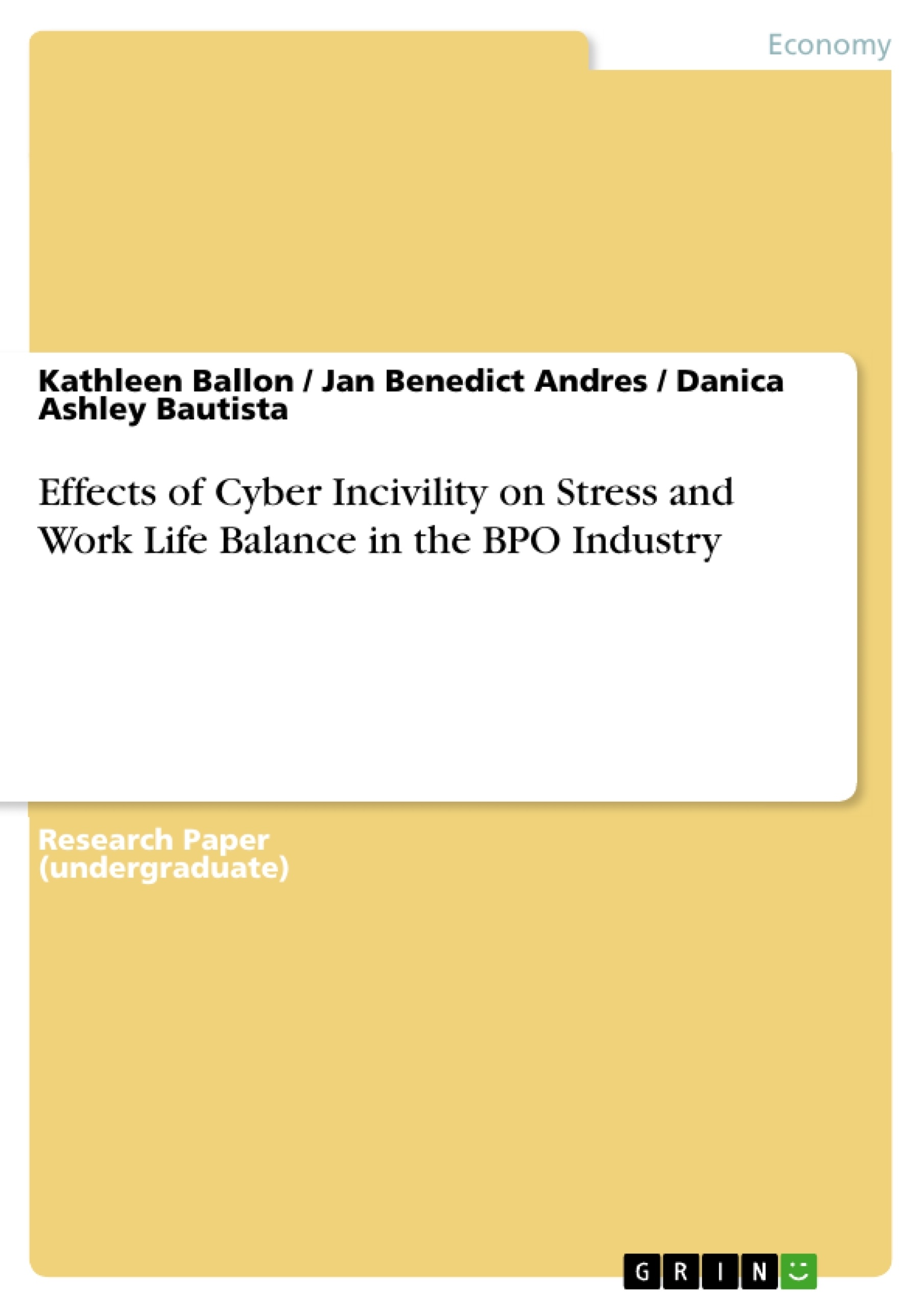The study aims to determine the effects of cyber incivility on employee work stress and turnover intent in the company. A total of 385 rank-and-file employees in the BPO industry, aged 18-55 years old, were requested to answer a 4-part questionnaire covering 4 constructs. Data gathered were processed through SPSS for Windows version 20 and AMOS version 24. SEM surprisingly resulted to an emerging model which deviated from the hypothesized model and particular influences of some constructs to the underlying dimensions of the other constructs. The results of the study raises awareness among the Human Resource practitioners regarding how cyber incivility affects BPO employees’ level of work stress and how committed they are to their organizations. Recommendations were made by the researchers, which may help the management to develop projects and programs that will lessen turnover intent.
Inhaltsverzeichnis (Table of Contents)
- 1. INTRODUCTION.
- 1.1 The Problem.
- 1.2 Objectives of the Study.
- 1.3 Scope and Delimitation.
- 1.4 Significance of the Study.
- 1.5 Definition of Terms.
- 2. THEORETICAL BACKGROUND
- 2.1 Theoretical Framework
- 2.1.1 Affective Events Theory (AET)
- 2.1.2 Conservation of Resources Theory
- 2.1.3 Spillover-Crossover Model
- 2.2 Literature Review.
- 2.2.1 Cyber Incivility
- 2.2.2 Stress
- 2.2.3 Turnover Intent.
- 2.2.4 Work-life Balance.
- 2.3 The Hypothesized Model.
- 3. METHODS.
- 3.1 Design.
- 3.2 Sample and Study Site
- 3.3 Instrumentation.....
- 3.4 Data Gathering Procedure and Ethical Consideration.......
- 3.5 Data/Mode of Analysis
- 4. DISCUSSION
- 5. CONCLUSION
Zielsetzung und Themenschwerpunkte (Objectives and Key Themes)
The study explores the impact of cyber incivility on employee work stress and turnover intention within the BPO industry. It aims to analyze how cyber incivility contributes to work-related stress and further investigate the mediating role of work stress in the connection between cyber incivility and work-life balance. This research seeks to provide valuable insights for HR practitioners and managers to develop effective strategies for managing and mitigating cyber incivility in the workplace.
- The impact of cyber incivility on employee work stress
- The relationship between cyber incivility and turnover intention
- The mediating role of work stress in the connection between cyber incivility and work-life balance
- The application of theoretical frameworks such as the Affective Events Theory, Conservation of Resources Theory, and the Spillover-Crossover Model
- The development of practical recommendations for HR practitioners and managers
Zusammenfassung der Kapitel (Chapter Summaries)
The introduction section lays out the problem of cyber incivility in the BPO industry, highlighting its potential impact on employee well-being and organizational outcomes. The theoretical background chapter delves into the theoretical frameworks used in the study, including the Affective Events Theory, Conservation of Resources Theory, and the Spillover-Crossover Model, providing a conceptual foundation for understanding the relationships between cyber incivility, work stress, turnover intent, and work-life balance. The methods chapter outlines the research design, sample selection, data collection methods, and data analysis techniques employed in the study.
Schlüsselwörter (Keywords)
The main keywords and focus topics of the research are: cyber incivility, work stress, turnover intent, work-life balance, BPO industry, Affective Events Theory, Conservation of Resources Theory, Spillover-Crossover Model, HR practices, and workplace management strategies.
Frequently Asked Questions
What is "cyber incivility" in the workplace?
Cyber incivility refers to rude or discourteous behaviors occurring through digital communication channels (like email or chat) in a professional setting.
How does cyber incivility affect BPO employees?
The study finds that cyber incivility significantly increases work stress and can lead to higher turnover intentions among rank-and-file employees in the BPO industry.
What are the mediating factors between incivility and work-life balance?
Work stress acts as a mediator; high levels of stress caused by digital rudeness negatively impact an employee's ability to maintain a healthy work-life balance.
Which theories are used to explain these effects?
The research applies Affective Events Theory (AET), Conservation of Resources Theory, and the Spillover-Crossover Model to understand employee reactions.
What can HR practitioners do to help?
The study recommends developing management projects and programs aimed at reducing cyber incivility to decrease turnover and improve organizational commitment.
- Citar trabajo
- Kathleen Ballon (Autor), Jan Benedict Andres (Autor), Danica Ashley Bautista (Autor), 2018, Effects of Cyber Incivility on Stress and Work Life Balance in the BPO Industry, Múnich, GRIN Verlag, https://www.grin.com/document/424865



